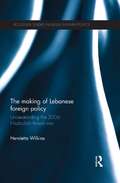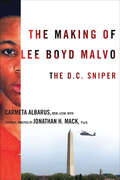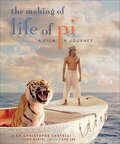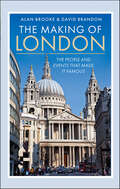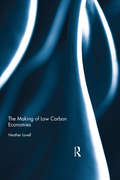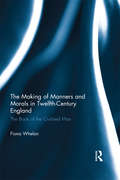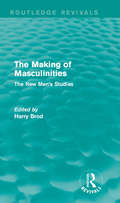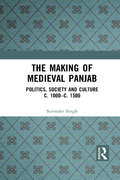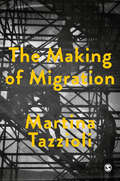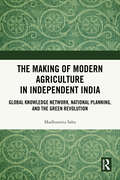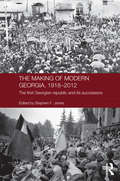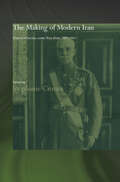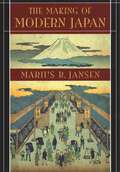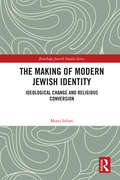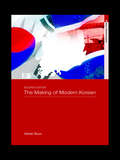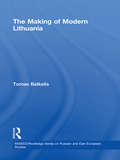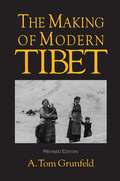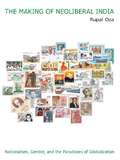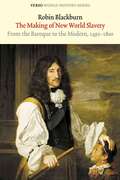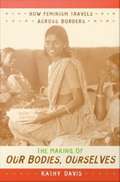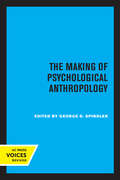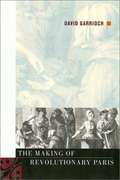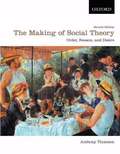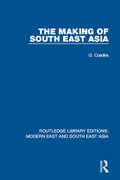- Table View
- List View
The Making of Lebanese Foreign Policy: Understanding the 2006 Hezbollah-Israeli War (Routledge Studies in Middle Eastern Politics)
by Henrietta WilkinsSeeking to explain Lebanon’s behavior in the international arena during the 2006 war between Hezbollah and Israel, this book offers a critique of both systemic and sub state factors in determining foreign policy decisions. The Making of Lebanese Foreign Policy illustrates how systemic theories are limited in terms of explaining foreign policy decisions because they largely ignore the role of internal, or sub state, factors. Within Lebanon, foreign policy is split between the interests of different internal Lebanese groups working in alliance with external actors. The competing interests of these internal groups compromise the cohesion of the Lebanese state and its capacity to promote its own interests above those of the different internal groups. The example of Lebanon during the 2006 war thus demonstrates the importance of these sub state factors in influencing state behaviour on an international level. Arguing that a more pluralistic approach is necessary in order to understand the conditions that affect the foreign policy making of the Lebanese state, this book fills an important gap in the literature on the topic and will be of interest to students of International Relations, Middle East Studies and Islamic Studies amongst others.
The Making of Lee Boyd Malvo: The D.C. Sniper
by Carmeta Albarus Jonathan MackIn October of 2002, a series of sniper attacks paralyzed the Washington Beltway, turning normally placid gas stations, parking lots, restaurants, and school grounds into chaotic killing fields. After the spree, ten people were dead and several others wounded. The perpetrators were forty-one-year-old John Allen Muhammad and his seventeen-year-old protégé, Lee Boyd Malvo. Called in by the judge to serve on Malvo's defense team, social worker Carmeta Albarus was instructed by the court to uncover any information that might help mitigate the death sentence the teen faced. Albarus met with Malvo numerous times and repeatedly traveled back to his homeland of Jamaica, as well as to Antigua, to interview his parents, family members, teachers, and friends. What she uncovered was the story of a once promising, intelligent young man, whose repeated abuse and abandonment left him detached from his biological parents and desperate for guidance and support. In search of a father figure, Malvo instead found John Muhammad, a veteran of the first Gulf War who intentionally shaped his protégé through a ruthlessly efficient campaign of brainwashing, sniper training, and race hatred, turning the susceptible teen into an angry, raging, and dissociated killer with no empathy for his victims.In this intimate and carefully documented account, Albarus details the nature of Malvo's tragic attachment to his perceived "hero father," his indoctrination, and his subsequent dissociation. She recounts her role in helping to extricate Malvo from the psychological clutches of Muhammad, which led to a dramatic courtroom confrontation with the man who manipulated and exploited him. Psychologist Jonathan H. Mack identifies and analyzes the underlying clinical psychological and behavioral processes that led to Malvo's dissociation and turn toward serial violence. With this tragic tale, the authors emphasize the importance of parental attachment and the need for positive and loving relationships during the critical years of early childhood development. By closely examining the impact of Lee Boyd Malvo's childhood on his later development, they reach out to parents, social workers, and the community for greater awareness and prevention.
The Making of Life of Pi: A Film, a Journey
by Jean-Christophe CastelliDiversely illustrated with 275 photographs and illustrations, The Making of Life of Pi tells the inside story of how renowned Academy Award-winning director Ang Lee brought Yann Martel's international bestseller to life as a 3-D film.With a rich, entertaining text and a wide variety of facts, anecdotes, visual portfolios, and sidebars sure to delight readers of all ages, The Making of Life of Pi follows the making of the film from pre-production through final cut. Of course, you'll meet Suraj Sharma, the sixteen-year-old unknown Indian high-school student who won the part of Pi although he had no acting experience and didn't even know how to swim—yet in the end performed all of his own stunts. You'll learn about the massive wave tank, custom-built for the film that replicated a vast, stormy ocean in all its moods, thanks to a complex and specially devised menu of wave and wind combinations, some really powerful machinery, and tons of water. You'll get to look inside the fifty-page fully illustrated "survival guide" that shipwreck survivor Steven Callahan created for Pi to consult on his raft. And you'll read about King, Themis, Minh, and Jonas, the four Bengal tigers used in the film—and discover how visual effects were able to create a seamless 3-D image of the tiger Richard Parker.A foreword by Yann Martel, an introduction by Ang Lee, and an incredible range of visual materials—fine art, vintage archival imagery, and commissioned portfolios by photographer Mary Ellen Mark and artist Alexis Rockman—supplement the film's storyboards, sketches, and stills, rounding out this highly experiential book for lovers of the novel and film viewers alike.
The Making of London: The People and Events That Made it Famous
by David Brandon Alan BrookeThe Making of London explores the rich history of the Metropolis from the Roman settlement established 2,000 years ago in the area that came to be known as the 'Square Mile' and traces the process whereby it eventually emerged as the world's greatest city. London became the capital and seat of government of Britain, a center of culture, entertainment and retailing, a major port and industrial center and world leader in international trade, commerce and finance. The focus is largely on central London but necessarily brings in other nearby districts when events involved interaction with these. While examining a selection of major historical events, consideration is also given to some of the more unusual and quirky aspects that have contributed to making London the diverse and fascinating place it remains today. A largely chronological approach is taken which emphasizes how the lives of the ordinary people were shaped by the events they witnessed such as invasions, riots and rebellions, fires, smogs, wars, epidemics and pandemics. The story embraces the apparent glamour of areas such as Mayfair and the West End but does not neglect districts stalked by crime, poverty and despair. London has always been a place of paradoxes where flaunted wealth has existed alongside appalling social deprivation. The juxtaposition of extravagance and poverty, of high culture with the lowest of low life is a recurrent theme in London's history. The Making of London will interest newcomers wishing to know about London's past but even those familiar with its history are likely to find something new in its pages.
The Making of Low Carbon Economies
by Heather LovellThe Making of Low Carbon Economies looks at how more than two decades of sustained effort at climate change mitigation has resulted in a variety of new practices, rules and ways of doing things: a period of active construction of low carbon economies. From outer space observations of the carbon in tropical forests, to carbon financial reporting, and insulating solid masonry walls, these diverse things, activities and objects are integral to how climate change has been brought into being as a problem. The book takes a fresh look at society’s response to climate change by examining a diverse array of empirical sites where climate change is being made real through its incorporation into everyday lives – a process of stitching climate concerns into the discourse and practices of already existing economies, as well as creating new economies. The Making of Low Carbon Economies adds fresh insights to economic sociology and science and technology studies scholarship on the multiple origins and heterogeneous operation of markets, demonstrating the constraints and opportunities of an economic framing of the problem of climate change. It covers the obvious (and now well-researched) topic of carbon markets, as well as new more unusual material on the low carbon reframing of already existing markets and economies.
The Making of Manners and Morals in Twelfth-Century England: The Book of the Civilised Man
by Fiona WhelanHow different are we from those in the past? Or, how different do we think we are from those in the past? Medieval people were more dirty and unhygienic than us – as novels, TV, and film would have us believe – but how much truth is there in this notion? This book seeks to challenge some of these preconceptions by examining medieval society through rules of conduct, and specifically through the lens of a medieval Latin text entitled The Book of the Civilised Man – or Urbanus magnus – which is attributed to Daniel of Beccles. Urbanus magnus is a twelfth-century poem of almost 3,000 lines which comprehensively surveys the day-to-day life of medieval society, including issues such as moral behaviour, friendship, marriage, hospitality, table manners, and diet. Currently, it is a neglected source for the social and cultural history of daily life in medieval England, but by incorporating modern ideas of disgust and taboo, and merging anthropology, sociology, and archaeology with history, this book aims to bring it to the fore, and to show that medieval people did have standards of behaviour. Although they may seem remote to modern ‘civilised’ people, there is both continuity and change in human behaviour throughout the centuries.
The Making of Masculinities: The New Men's Studies (Routledge Revivals)
by Harry BrodThis book, first published in 1987, is both simple in conception and ambitious in intention. It aims at legitimating the new interdisciplinary field of men's studies as one of the most significant and challenging intellectual and curricular developments in academia. The fourteen essays included here are drawn from such diverse disciplines as men's studies, philosophy, psychology, sociology, history, anthropology, Black studies, biology, English literature, and gay studies.
The Making of Medieval Panjab: Politics, Society and Culture c. 1000–c. 1500
by Surinder SinghThis book seeks to reconstruct the past of undivided Panjab during five medieval centuries. It opens with a narrative of the efforts of Turkish warlords to achieve control in the face of tribal resistance, internal dissensions and external invasions. It examines the linkages of the ruling class with Zamindars and Sufis, paving the way for canal irrigation and agrarian expansion, thus strengthening the roots of the state in the region. While focusing on the post-Timur phase, it tries to make sense of the new ways of acquiring political power. This work uncovers the perpetual attempts of Zamindars to achieve local dominance, particularly in the context of declining presence of the state in the countryside. In this ambitious enterprise, they resorted to the support of their clans, adherence to hallowed customs and recurrent use of violence, all applied through a system of collective and participatory decision-making. The volume traces the growth of Sufi lineages built on training disciples, writing books, composing poetry and claiming miraculous powers. Besides delving into the relations of the Sufis with the state and different sections of the society, it offers an account of the rituals at a prominent shrine. Paying equal attention to the southeastern region, it deals with engagement of the Sabiris, among other exemplars, with the Islamic spirituality. Inclusive in approach and lucid in expression, the work relies on a wide range of evidence from Persian chronicles, Sufi literature and folklore, some of which have been used for the first time. Please note: Taylor & Francis does not sell or distribute the Hardback in India, Pakistan, Nepal, Bhutan, Bangladesh and Sri Lanka
The Making of Migration: The Biopolitics of Mobility at Europe’s Borders (Society and Space)
by Martina TazzioliThe Making of Migration addresses the rapid phenomenon that has become one of the most contentious issues in contemporary life: how are migrants governed as individual subjects and as part of groups? What are the modes of control, identification and partitions that migrants are subjected to? Bringing together an ethnographically grounded analysis of migration, and a critical theoretical engagement with the security and humanitarian modes of governing migrants, the book pushes us to rethink notions that are central in current political theory such as &“multiplicity&” and subjectivity. This is an innovative and sophisticated study; deploying migration as an analytical angle for complicating and reconceptualising the emergence of collective subjects, mechanisms of individualisation, and political invisibility/visibility. A must-read for students of Migration Studies, Political Geography, Political Theory, International Relations, and Sociology.
The Making of Migration: The Biopolitics of Mobility at Europe’s Borders (Society and Space)
by Martina TazzioliThe Making of Migration addresses the rapid phenomenon that has become one of the most contentious issues in contemporary life: how are migrants governed as individual subjects and as part of groups? What are the modes of control, identification and partitions that migrants are subjected to? Bringing together an ethnographically grounded analysis of migration, and a critical theoretical engagement with the security and humanitarian modes of governing migrants, the book pushes us to rethink notions that are central in current political theory such as "multiplicity" and subjectivity. This is an innovative and sophisticated study; deploying migration as an analytical angle for complicating and reconceptualising the emergence of collective subjects, mechanisms of individualisation, and political invisibility/visibility. A must-read for students of Migration Studies, Political Geography, Political Theory, International Relations, and Sociology.
The Making of Modern Agriculture in Independent India: Global Knowledge Network, National Planning, and the Green Revolution
by Madhumita SahaThis book provides a comprehensive historical account of agricultural development in independent India. It studies concerns regarding food shortages in the years immediately after independence, covers the debates over the introduction of Green Revolution technology, and examines the knowledge network that facilitated the introduction of new seeds.The book presents a critical examination of agricultural modernisation—its technoscientific practices, manpower, and institutions—and provides deeper insights into how it shaped the rural economy, the relationships it maintained with agricultural sciences, and the extensive control it sought to exert over the environment. It examines multiple facets of food crop research, from sites of knowledge production, transnational knowledge networks, and the evolution of the research community, to the challenges faced by Indian agricultural scientists.An important contribution, this book will be an essential read for scholars and researchers of South Asian Studies, agriculture, food security, historians of science and technology, environmental studies, developmental studies, agrarian studies, modern Indian history, and the Cold War.
The Making of Modern Georgia, 1918-2012: The First Georgian Republic and its Successors (Routledge Contemporary Russia and Eastern Europe Series)
by Stephen F. JonesWhen most of Eastern Europe was struggling with dictatorships of one kind or another, the Democratic Republic of Georgia (1918-1921) established a constitution, a parliamentary system with national elections, an active opposition, and a free press. Like the Democratic Republic of Georgia in 1918, its successors emerged after 1991 from a bankrupt empire, and faced, yet again, the task of establishing a new economic, political and social system from scratch. In both 1918 and 1991, Georgia was confronted with a hostile Russia and followed a pro-Western and pro-democratic course. The top regional experts in this book explore the domestic and external parallels between the Georgian post-colonial governments of the early twentieth and twenty-first centuries. How did the inexperienced Georgian leaders in both eras deal with the challenge of secessionism, what were their state building strategies, and what did democracy mean to them? What did their electoral systems look like, why were their economic strategies so different, and how did they negotiate with the international community neighbouring threats. These are the central challenges of transitional governments around the world today. Georgia’s experience over one hundred years suggests that both history and contemporary political analysis offer the best (and most interesting) explanation of the often ambivalent outcomes.
The Making of Modern Iran: State and Society under Riza Shah, 1921-1941 (Routledge/BIPS Persian Studies Series)
by Stephanie CroninThis collection of essays, by a distinguished group of specialists, offers a new and exciting interpretation of Riza Shah's Iran. A period of key importance, the years between 1921-1941 have, until now, remained relatively neglected. Recently, however, there has been a marked revival of interest in the history of these two decades and this collection brings together some of the best of this recent new scholarship. Illustrating the diversity and complexity of interpretations to which contemporary scholarship has given rise, the collection looks at both the high politics of the new state and at 'history from below', examining some of the fierce controversies which have arisen surrounding such issues as the gender politics of the new regime, the nature of its nationalism, and its treatment of minorities.
The Making of Modern Japan
by Marius B. JansenMagisterial in vision, sweeping in scope, this monumental work presents a seamless account of Japanese society during the modern era, from 1600 to the present. A distillation of more than fifty years' engagement with Japan and its history, it is the crowning work of our leading interpreter of the modern Japanese experience. Since 1600 Japan has undergone three periods of wrenching social and institutional change, following the imposition of hegemonic order on feudal society by the Tokugawa shogun; the opening of Japan's ports by Commodore Perry; and defeat in World War II. The Making of Modern Japan charts these changes: the social engineering begun with the founding of the shogunate in 1600, the emergence of village and castle towns with consumer populations, and the diffusion of samurai values in the culture. Jansen covers the making of the modern state, the adaptation of Western models, growing international trade, the broadening opportunity in Japanese society with industrialization, and the postwar occupation reforms imposed by General MacArthur. Throughout, the book gives voice to the individuals and views that have shaped the actions and beliefs of the Japanese, with writers, artists, and thinkers, as well as political leaders given their due. The story this book tells, though marked by profound changes, is also one of remarkable consistency, in which continuities outweigh upheavals in the development of society, and successive waves of outside influence have only served to strengthen a sense of what is unique and native to Japanese experience. The Making of Modern Japan takes us to the core of this experience as it illuminates one of the contemporary world's most compelling transformations.
The Making of Modern Jewish Identity: Ideological Change and Religious Conversion (Routledge Jewish Studies Series)
by Motti InbariThis volume explores the processes that led several modern Jewish leaders – rabbis, politicians, and intellectuals – to make radical changes to their ideology regarding Zionism, Socialism, and Orthodoxy. Comparing their ideological change to acts of conversion, the study examines the philosophical, sociological, and psychological path of the leaders’ transformation. The individuals examined are novelist Arthur Koestler, who transformed from a devout Communist to an anti-Communist crusader following the atrocities of the Stalin regime; Norman Podhoretz, editor of Commentary magazine, who moved from the New Left to neoconservative, disillusioned by US liberal politics; Yissachar Shlomo Teichtel, who transformed from an ultra-Orthodox anti-Zionist Hungarian rabbi to messianic Religious-Zionist due to the events of the Holocaust; Ruth Ben-David, who converted to Judaism after the Second World War in France because of her sympathy with Zionism, eventually becoming a radical anti-Israeli advocate; Haim Herman Cohn, Israeli Supreme Court justice, who grew up as a non-Zionist Orthodox Jew in Germany, later renouncing his belief in God due to the events of the Holocaust; and Avraham (Avrum) Burg, prominent centrist Israeli politician who served as the Speaker of the Knesset and head of the Jewish Agency, who later became a post-Zionist. Comparing aspects of modern politics to religion, the book will be of interest to researchers in a broad range of areas including modern Jewish studies, sociology of religion, and political science.
The Making of Modern Korea
by Adrian BuzoThis fully updated second edition of The Making of Modern Korea provides a thorough, balanced and engaging history of Korea from 1910 to the present day. The text is unique in placing emphasis on Korea’s regional and geographical context, through which Buzo analyzes the influence of bigger and more powerful states on the peninsula of Korea. Key features of the book include: comprehensive coverage of Korean history up-to-date analysis of important contemporary developments, including North Korea’s controversial missile and nuclear tests comparative focus on North and South Korea an examination of Korea within its regional context a detailed chronology and suggestions for further reading. The Making of Modern Korea is a valuable one-volume resource for students of modern Korean history, international politics and Asian Studies.
The Making of Modern Lithuania (BASEES/Routledge Series on Russian and East European Studies)
by Tomas BalkelisThis book argues that – contrary to contemporary Lithuanian nationalist rhetoric – Lithuanian nationalism was modern and socially constructed in the period from the emergence of the Lithuanian national movement in the late nineteenth century to the birth of an independent state in 1918. The book brings into sharp focus those aspects of the history of Lithuania that earlier commentators had not systematically explored: it shows how, in this period, the nascent political elite fashioned its own and the emerging nation’s identity. Moreover, factors such as the elite’s social isolation, educational experience, marital strategies and narrowly based, fragmented and uncoordinated political activities were crucial factors in shaping identity and nation-building. It demonstrates how the elite was often in conflict with the peasantry, the religious establishment and other ethnic groups, and how critical considerations such as class, religion, displacement and ethnicity – rather than national ideology – were. The book’s conclusion that Lithuanian nationalism is a construct emerging from modern social forces is highly significant for understanding nationalism and contemporary political developments in Eastern Europe more generally.
The Making of Modern Tibet
by A.Tom GrunfeldAn account of Tibet and the Tibetan people that emphasises the political history of the 20th century. This book attempts to reach beyond the polemics by considering the various historical arguments, using archival material from several nations and drawing conclusions focused on available documents.
The Making of Neoliberal India: Nationalism, Gender, and the Paradoxes of Globalization
by Rupal OzaThis is an ambitious study of gender and politics in India, and will be of interest to scholars of women's studies, globalization, postcolonialism, geography, media studies, and cultural studies, as well as India more generally.
The Making of New World Slavery: From the Baroque to the Modern, 1492-1800 (Verso World History Series)
by Robin BlackburnThe Making of New World Slavery argues that independent commerce, geared to burgeoning consumer markets, was the driving force behind the rise of plantation slavery. The baroque state sought—successfully—to feed upon this commerce and—with markedly less success—to regulate slavery and racial relations. To illustrate this thesis, Blackburn examines the deployment of slaves in the colonial possessions of the Portuguese, the Spanish, the Dutch, the English and the French. Plantation slavery is shown to have emerged from the impulses of civil society, not from the strategies of individual states. <p><p> Robin Blackburn argues that the organization of slave plantations placed the West on a destructive path to modernity and that greatly preferable alternatives were both proposed and rejected. Finally, he shows that the surge of Atlantic trade, predicated on the murderous toil of the plantations, made a decisive contribution to both the Industrial Revolution and the rise of the West.
The Making of Our Bodies, Ourselves: How Feminism Travels across Borders
by Inderpal Grewal Caren Kaplan Robyn Wiegman Kathy DavisThe book Our Bodies, Ourselves is a feminist success story. Selling more than four million copies since its debut in 1970, it has challenged medical dogmas about women's bodies and sexuality, shaped health care policies, energized the reproductive rights movement, and stimulated medical research on women's health. The book has influenced how generations of U.S. women feel about their bodies and health. Our Bodies, Ourselves has also had a whole life outside the United States. It has been taken up, translated, and adapted by women across the globe, inspiring more than thirty foreign language editions.Kathy Davis tells the story of this remarkable book's global circulation. Based on interviews with members of the Boston Women's Health Book Collective, the group of women who created Our Bodies, Ourselves, as well as responses to the book from readers, and discussions with translators from Latin America, Egypt, Thailand, China, Eastern Europe, Francophone Africa, and many other countries and regions, Davis shows why Our Bodies, Ourselves could never have been so influential if it had been just a popular manual on women's health. It was precisely the book's distinctive epistemology, inviting women to use their own experiences as resources for producing situated, critical knowledge about their bodies and health, that allowed the book to speak to so many women within and outside the United States. Davis provides a grounded analysis of how feminist knowledge and political practice actually travel, and she shows how the process of transforming Our Bodies, Ourselves offers a glimpse of a truly transnational feminism, one that joins the acknowledgment of difference and diversity among women in different locations with critical reflexivity and political empowerment.
The Making of Psychological Anthropology
by George D. SpindlerThis title is part of UC Press's Voices Revived program, which commemorates University of California Press’s mission to seek out and cultivate the brightest minds and give them voice, reach, and impact. Drawing on a backlist dating to 1893, Voices Revived makes high-quality, peer-reviewed scholarship accessible once again using print-on-demand technology. This title was originally published in 1978.
The Making of Revolutionary Paris
by David GarriochA sweeping, beautifully written, illustrated history of the world's most fascinating city--Paris--during the eighteenth century.
The Making of Social Theory: Order, Reason, and Desire
by Anthony ThomsonThe second edition of this book retains its unique coverage of pre-Enlightenment ideas and presents this material in a compact, manageable introduction to the text. New material includes a chapter examining the fate of Marxism in the early decades of the twentieth century and a chapter dedicated to tracing the evolution of social democracy through Pareto and Mannheim. The author strives to create links between the classical and contemporary worlds, allowing students to see how classical theory has helped to shape the ideas of today.
The Making of South East Asia (Routledge Library Editions: Modern East and South East Asia)
by George CoedesFrom the time of its original publication in France, this cultural history (first published in English in 1966) by an international authority has stood apart from other histories of South East Asia. Most such accounts describe events before 1500 in summary fashion, and concentrate on later developments. This book, on the contrary, deals mainly with the earlier, formative epochs that marked the flowering in the region of the Great Traditions of Hinduism and of Buddhism. Following a succinct sketch of the prehistoric period, the book moves on to a chronological account of the developments from the Chinese conquest of Annam in the third century to the period of European conquest in the nineteenth. It reflects the author’s thoughtful views concerning the evolution of political institutions, religions, literatures, and arts that distinguished the region. In geographical scope it embraces Thailand, Burma, and the area formerly known as French Indochina, and is an indispensable guide to the making of the region.
